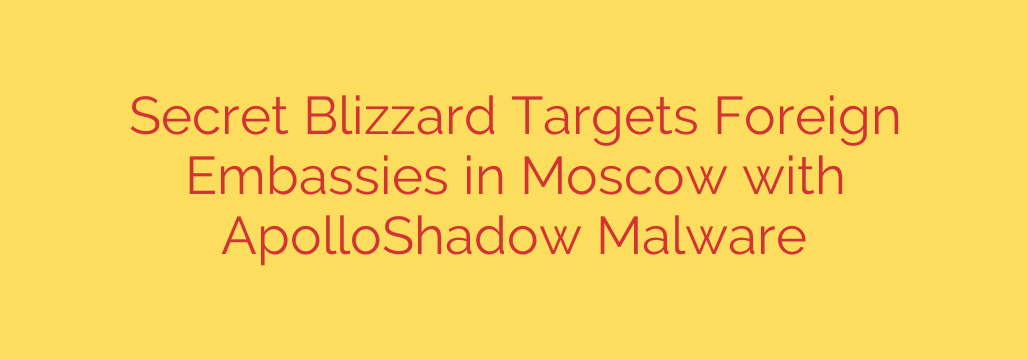
New Cyber Espionage Campaign: ‘Secret Blizzard’ Targets Moscow Embassies
A sophisticated cyber espionage campaign is actively targeting foreign diplomatic missions in Moscow, deploying a custom backdoor designed to steal sensitive information. This operation, attributed to a threat actor group known as Secret Blizzard, highlights the growing use of cyber tactics in geopolitical intelligence gathering.
The attacks demonstrate a high level of operational security and a deep understanding of the diplomatic landscape, focusing specifically on high-value government targets to gain political and strategic advantages.
The Attack Vector: A Deceptive Lure
The primary method of infiltration used by Secret Blizzard is spear-phishing. Attackers craft deceptive emails that appear legitimate to their diplomatic targets. These emails contain a malicious ZIP archive, often disguised as an important document or image file.
Inside the archive lies the key to the attack: a malicious LNK file. When a user clicks this shortcut file, it executes a PowerShell script. This script acts as a dropper, connecting to a remote server to download the main payload, a dangerous piece of malware known as ApolloShadow.
This multi-stage attack is designed to bypass initial security checks, as LNK files and PowerShell are legitimate components of the Windows operating system.
What is ApolloShadow Malware?
ApolloShadow is a custom backdoor engineered for stealth and persistence. Once installed on a victim’s system, it provides the attackers with complete remote control. Its primary capabilities include:
- Executing arbitrary commands on the infected machine.
- Exfiltrating (stealing) sensitive files and documents.
- Conducting reconnaissance of the compromised network.
- Maintaining long-term access by establishing persistence, ensuring the malware survives system reboots.
The malware communicates with its command-and-control (C2) servers using encrypted channels, making its activity difficult to detect through network monitoring alone. The development of custom malware like ApolloShadow indicates that the Secret Blizzard group is well-resourced and highly skilled.
Why Target Embassies?
Foreign embassies are among the most valuable targets for state-sponsored hacking groups. Gaining access to an embassy’s internal network can provide an adversary with priceless intelligence, including:
- Confidential diplomatic communications and cables.
- Negotiating positions on international treaties and conflicts.
- Information on political and economic strategies.
- Personal data on government officials and diplomats.
By compromising these networks, threat actors like Secret Blizzard can provide their sponsors with a significant upper hand in international relations.
How to Defend Against These Sophisticated Attacks
Protecting against targeted threats like the Secret Blizzard campaign requires a multi-layered security approach. Organizations, especially those in government and diplomatic sectors, should take immediate steps to bolster their defenses.
Key Security Recommendations:
- Enhance Email Security: Deploy advanced email security solutions that can scan for and block malicious attachments, including ZIP archives containing dangerous file types like LNK files.
- Employee Training: Conduct regular security awareness training to educate staff on how to identify and report spear-phishing attempts. Emphasize the danger of opening unsolicited attachments, even if they appear to come from a known source.
- Restrict PowerShell Usage: Implement policies to restrict the use of PowerShell for standard users. Its execution should be limited to administrators and systems that require it for legitimate functions.
- Harden Endpoints: Use a modern Endpoint Detection and Response (EDR) solution to monitor for suspicious activity, such as a shortcut file executing a PowerShell command to download a file from the internet.
- Network Monitoring: Actively monitor outbound network traffic for unusual connections or data flows that could indicate a C2 communication channel.
- Principle of Least Privilege: Ensure that users only have access to the data and systems absolutely necessary for their jobs. This limits the potential damage an attacker can cause if an account is compromised.
The emergence of the Secret Blizzard group and its focused attacks on diplomatic missions is a stark reminder that cyber espionage is a constant and evolving threat. Vigilance, combined with robust technical controls and user education, is the best defense against these advanced adversaries.
Source: https://securityaffairs.com/180638/apt/russia-linked-apt-secret-blizzard-targets-foreign-embassies-in-moscow-with-apolloshadow-malware.html








